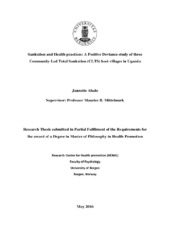| dc.description.abstract | Background: Uganda is hard hit by poor access to clean water, lack of basic sanitary facilities and practices, and the high cost of health care, all contributing to a high toll of infection-related illness. Although Uganda has one of the most advanced, harmonized and coordinated water sectors in Africa, her progress in water supply, and sanitation has stagnated in the last few years. This stagnation factor is strongly attributed to the limited political prioritization of the sector, inadequate funding, poor O&M practices and limited translation of policy into practice at different levels of governance. Responding, in 2010 the Uganda government implemented a Community Led Total Sanitation (CLTS) programme, using a participatory approach to empower communities to achieve better sanitation/health. Much can be learned from the experience of particular households in CLTS communities that managed to achieve significant sanitation improvements, despite ubiquitous deprivation. Conceptual framework: The study therefore, used the positive deviance (PD)' method/ approach as a conceptual framework to study such success. PD is an innovative public health strategy to learn from people whose uncommon but successful behaviours or strategies enable them to find better solutions to a problem than their peers, despite facing similar challenges and having no extra resources. In the Global South, earlier evidences point to the successful application of the PD in improving child nutrition and other public health challenges but until now, it had not been used as an approach to address the need for better sanitation. Using PD, this study examined sanitation achievements in households with best practice. Methods: Between June and September 2015, a qualitative case study was conducted in Nawango, Mpanga and Bule villages in Bulo sub-county, Uganda. These villages hosted the CLTS programme in 2013/2014 and emerged with varying results. Their variation inspired curiosity and offered the study several opportunities based on both cultural and socio economic diversities. The study then utilized a purposive sampling method in selecting experienced informants based on their association with the CLTS, position of significance in society and knowledge/participation in other past health programs. Using the local council chairpersons and village health teams as gatekeepers to these villages, both PD and non- PD households were recruitment. Field data were collected through semi-structured in-depth audiotaped interviews, and observations. Participants were 2 district health officers, 10 men, and 31 women in 41 households. Data was analyzed using Attride stirling's thematic network analysis. Results: Based on reported and observed sanitation and health care practices, the researcher identified 25 non-PD and 16 PD households in the 3 villages. In this context, PDs were those households who managed to practice better sanitation despite facing various health care challenges and the non- PDs were those households who despite having access to modern health care, VHTs, village drug points and health education, failed to practice better sanitation. This meant that non-PDs not only exposed their families, but the entire community to preventable sanitary diseases. Compared to non-PD households, PDs engaged in traditional sanitary/health practices where they consulted practitioners of traditional medicine such as birth attendants and traditionalist’s shrines to deal with infectious diseases e.g. diarrhea and malaria. For modern medicin e such as de-wormers, PDs visited Bulo health center III and village drug points to access treatments for under-fives and expectant mothers. The high costs of treating sanitary diseases among these destitute households, coupled with fear of coercions /shame from local leaders and village mates for indiscriminate defecation, forced PD households to practice better sanitation. PDs mentioned how they had learnt the benefits of sleeping under treated nets, washing hands with ash / soap, and eliminating open defecation from health education. For indigenous health ideas, PDs revealed how listening and learning from elders and extended families had enhanced their good sanitary practices. Conclusion: In the deprived villages studied, the use of PD was effective in identifying particular instances of good household sanitation practices amongst the majority of households that struggled less successfully to achieve good sanitation. Use of traditional medicine from birth attendants and traditionalist’s shrines, visiting Bulo health center III and village drug points for treatments, high costs of treatments coupled with fear of coercions /shame and health education meetings, triggered the PD behaviors discovered in the study. Indigenous health ideas from elders and extended families also motivated PD practices. These trigger factors could be studied and targeted in future interventions to improve sanitation in households in similar villages /locations. This study is thus the first to demonstrate he value of the PD method in community sanitation research in the Global South. | en_US |
